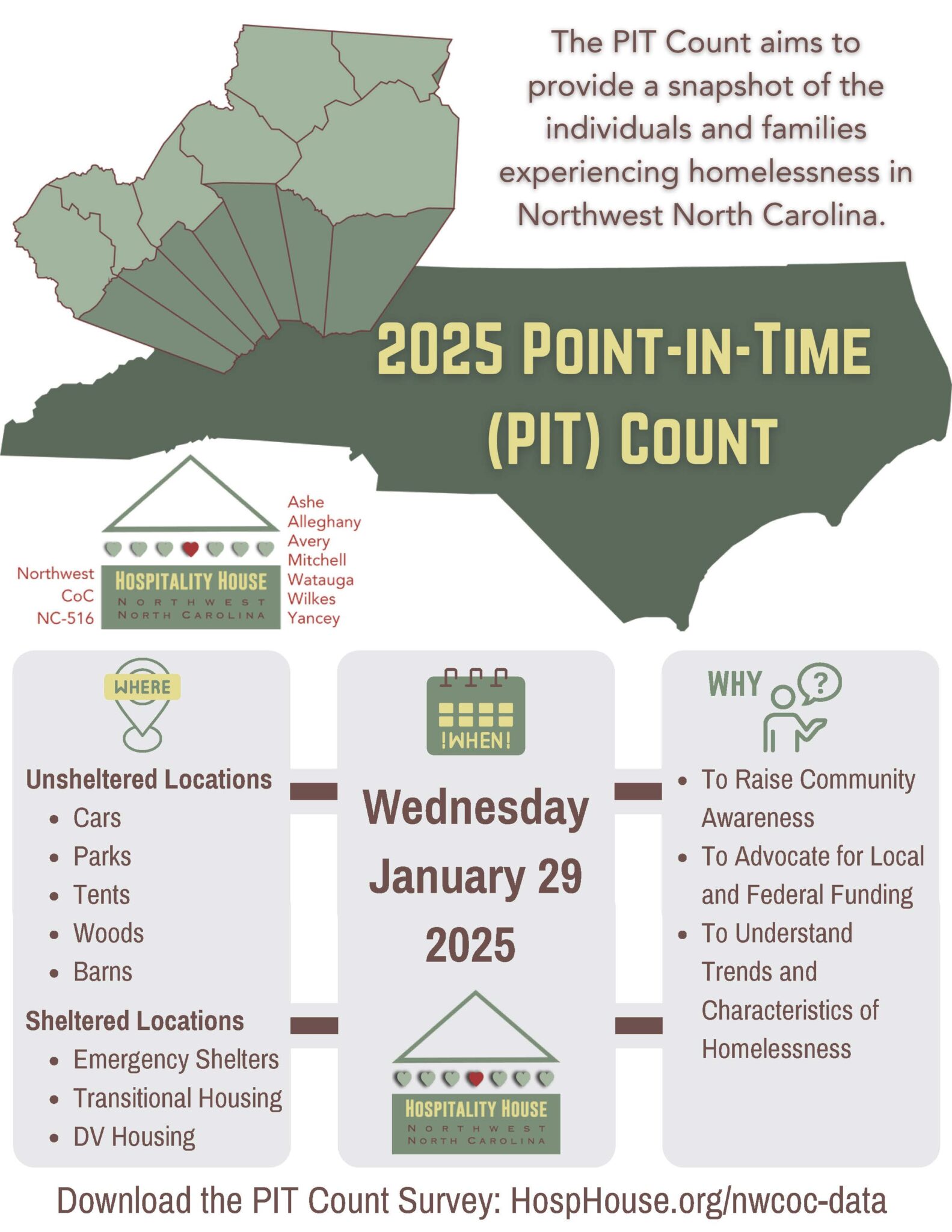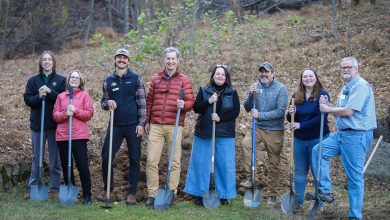
Last Updated on January 26, 2025 2:27 pm
Boone, N.C.: Wednesday, January 29, 2025, marks the annual homeless Point-in-Time Count. The Point-in-Time (PIT) Count, coordinated by the Northwest N.C. Continuum of Care (CoC), is the annual documentation of the extent of homelessness in the High Country region, which includes Alleghany, Ashe, Avery, Mitchell, Watauga, Wilkes, and Yancey counties. The information from the PIT Count provides valuable insight into the extent of homelessness in the region and informs support service providers on the priorities to prevent and end homelessness.
Point-in-Time data is important as it provides an approximate scope of homelessness in the seven-county region and helps eligible agencies in the Northwest N.C. CoC apply for funding to work towards ending homelessness. PIT data is submitted each year by the Northwest N.C. CoC to the Department of Housing and Urban Development (HUD) who then submits the report to U.S. Congress in its AHAR (Annual Homeless Assessment Report) each December.
The PIT Count is a one-day unduplicated count of sheltered and unsheltered homeless individuals and families across the nation. The Point-in-Time Count is a requirement of HUD, which currently supports the Northwest N.C. CoC member agencies with $519,624 – or $668,499 annually including a special NOFO (Notice of Funding Opportunities) — in competitive grant funding. Programs that have beds dedicated to serve homeless individuals and families also conduct a bed inventory for the Housing Inventory Count (HIC).
The 2024 PIT Count documented 336 people experiencing homelessness both sheltered and unsheltered, fifteen percent of those being children and adolescents under the age of eighteen. During this one-night snapshot, 191 of the total individuals were unsheltered with fifteen percent of those being children.
“In order for our region to maximize its voice, the Northwest N.C. CoC needs active communities, across the seven counties, to make the Point-in-Time Count effective in showing the true picture of rural homelessness,” states Northwest N.C. CoC lead and Hospitality House of Northwest North Carolina executive director Tina B. Krause. “This is even more pressing now than in previous years because of the impact of Hurricane Helene.”
Continues Krause, “Prior to Helene, we were already experiencing an increase in both sheltered and unsheltered homelessness. From the 2023 PIT to the 2024 PIT there was a twenty-two percent increase in homelessness across our region. Currently, most of the people reaching out for assistance were not at risk of becoming homeless before the storm. Many of them are working adults with decent incomes or retirees on fixed incomes. There’s definitely a new face of homelessness now.”
The CoC asks service providers – food pantries, shelters, community kitchens, and hospitals; as well as, churches, local government agencies, school systems, and law enforcement agencies who are in contact with individuals and families experiencing homelessness to contact Hospitality House of Northwest N.C, the lead agency of the Northwest CoC, so that everyone experiencing homelessness is counted. Please call (828) 264-1237 and speak with director of grant funding Ethan Flynn or email him at grants@hosphouse.org. The 2025 PIT Count Survey can be accessed and downloaded at hosphouse.org/nwcoc-data
Krause adds, “We’re going to have to be very purposeful in looking at who’s in a hotel, due to losing their housing during Helene. If the hotel room is being paid for by an agency, then those individuals can be counted in the point-in-time because they are literally homeless as long as they’re not paying for the hotel themselves. We need to increase the number of outreach teams going out and actually talking to people to see what their situation is.”
If you are experiencing homelessness, please come forward and be counted by one of these service agencies. The count respects the confidentiality of anyone experiencing homelessness by removing names once the demographic data is collected and does not obligate anyone for unwanted services. Knowing the extent of homelessness, particularly homeless families, and veterans, assists the development of support services to meet the basic needs of housing for those in need.



















